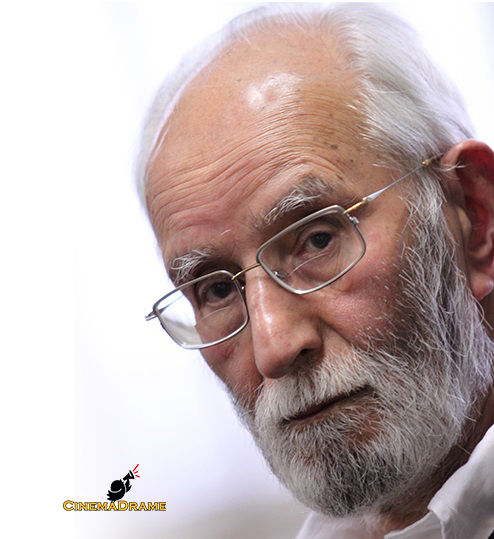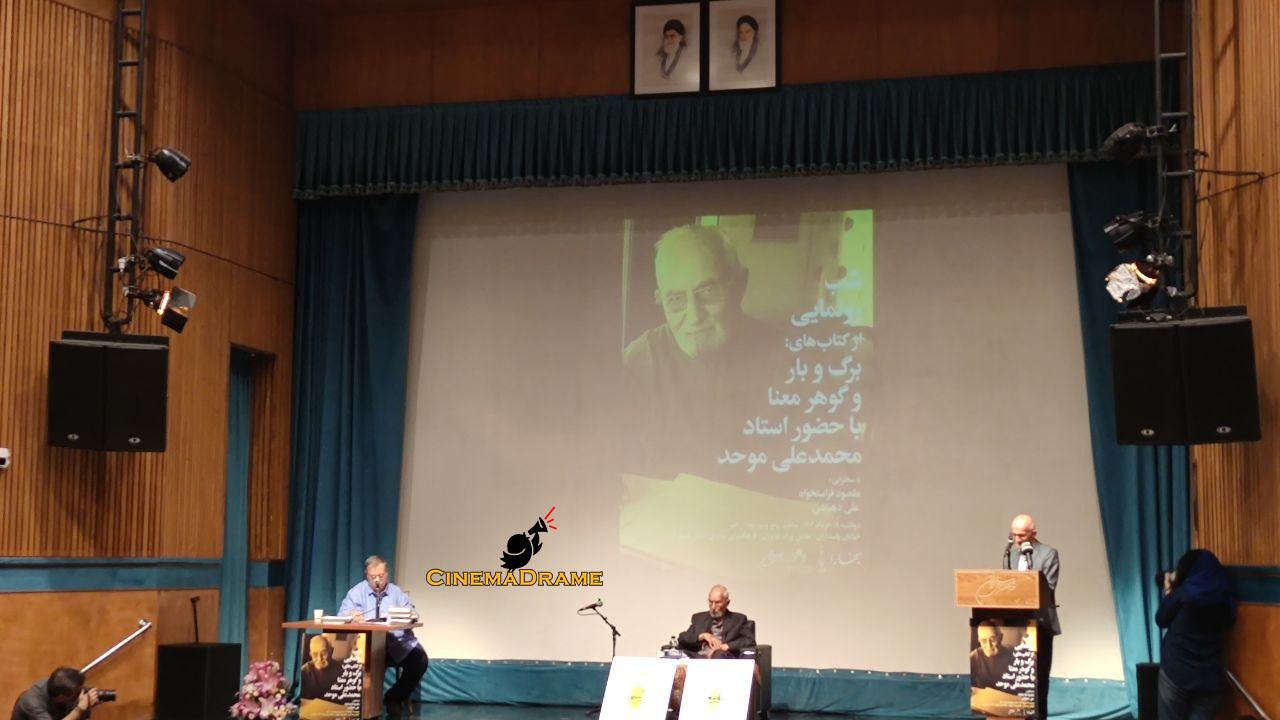Professor Mohammad Ali Movahed: The Future is in the Hands of the Young Generation

According to CinamaDrame News Agency, Mohammad Ali Movahed, on Monday evening (June 8th), at the 860th night of the Bukhara Magazine series and the unveiling ceremony of the books “Barg-o-Bar” (Leaf and Fruit) and “Gohar-e Ma’na” (Essence of Meaning), abstained from speaking about himself in the presence of a group of thinkers at the Persian Gulf Hall of Niavaran Cultural Center, stating: “We struggled, but we did not write anything truly countable. In the words of my fellow citizen, Saeb Tabrizi; ‘Though in the madness of practice, I spent my whole life at the top / I did not write a line that could be given to a hand.'”
He continued by reciting verses from Saadi Shirazi: “My opinion is that if they see and like one out of a thousand verses, it is enough for me.”
This researcher and Rumi scholar stated: “What I can say about my work is what Attar says at the beginning of Tazkirat al-Awliya: ‘I have tied myself to the stirrup of the great, and if I have gained any reputation, it is from their names.'”
He continued by reciting verses from Rumi: “You cannot reach the soaring hawk by chasing its shadow / Come to the hunting ground of the unseen and behold the prey / Come to the shores and the sea to observe and behold / Take a royal pearl from the crest of its wave.”
This professor explained these verses, saying: “Rumi says for someone like me that you cannot reach the one who flies at the peak of the sky; you can follow his shadow, and I did that.”
In response to a question about the future of Iran, he said: “You should ask the youth about the future; we know about the past. The future is in the hands of the youth.”
Movahed: A Model for Understanding, Research, and Scientific Dignity
A sociologist and faculty member of the Institute for Research and Planning in Higher Education also began the program by explaining the scientific journey of Professor Movahed, saying: “He speaks about a vast range of topics; from energy and oil companies and its complex history to issues and international law disputes, from the relationship between religion and state and its conflicts, to human rights, justice, freedom, and even the abuses that have occurred during 60 years of sincere conduct in this land.”
Maqsoud Farasatkhah added: “Movahed is a master who has one eye fixed on the world of multiplicity and objective realities, and the other on the world of unity and meanings. What a scholar, what a vibrant life. What a chronicle of life and virtue, of the reasonable and civil life of a monotheist. He is one of the last jewels of an irreplaceable generation: the generation of great teachers, the generation of the era of polymaths.”
Farasatkhah, stating that he could not provide a description for Movahed‘s works, said: “No matter how much I tried to select a brief piece for this gathering from this vast volume of works and their unparalleled diversity, whose prefaces alone form the introduction to two thick volumes, I could not. Each section contains serious insights.”
Referring to the book “Khab-e Ashofteh-ye Naft” (The Troubled Dream of Oil), one of Professor Movahed‘s works, he said: “The professor explains that the twentieth century in Iran began with the D’Arcy Concession in 1901; a century filled with the smoke and breath of the oil industry. He refers to three revolutions in contemporary history: the Constitutional Revolution, the National Oil Industry Movement, and the Islamic Revolution.”
Movahed continues with a profound question: How did Iran’s structure fail to achieve reasonable and sustainable development? Explaining this sorrowful story requires a broader opportunity. Here, the professor takes the reader’s hand and leads them into the real world, the political economy of Iran and the world, and into how a big game was formed in the world, with the Middle East and Iran at its heart, and how much political wisdom, national awareness, and civic maturity are needed to live intelligently in this game.
The faculty member of the Institute for Research and Planning in Higher Education said: “He compares Abadan of the refinery with Abadan of Naser Khosrow; ships anchored in the Gulf waiting to be filled with oil. The professor speaks of methodology, anthropology, and scientific descriptions in this field. In the matter of the coup of August 19, he presents a documented narrative of tribesmen who, with knowledge and slogans, marched towards the Khorramshahr telegraph office before noon, showing loyalty to Mohammad Mosaddegh, the then Prime Minister of Iran, but at noon on the same day, the same crowd, misogynistically, shouted towards the autocratic ruler.”
This sociologist added: “Such is Iran; a land where a sigh ignites and is extinguished with a puff. Professor Movahed, as a realistic analyst, speaks of the jealousies, calculations, stubbornness, and extremism in our political culture, but at the same time shows how from the heart of this smoke and fire, from amidst the strong smell of oil and the explosive aspects of politics, sublime forms of Iranian imagination, civil movements, and reasonable examples of civil action are still ongoing.”
He concluded his speech by addressing the youth: “I end my final words with sincere praise for Professor Movahed. This professor researched, wrote, and thought for 60 years, but always with precision, responsibility, integrity of pen, and virtue of mind. He explored both internal sources and external documents. He weighed everything carefully, had a research method, and meticulously observed the combination of ideas. He wrote without pretense. If he was surprised by someone, he said so honestly. If he expressed aversion, he stated it with scientific courage. Dear youth, stay away from superficiality and get closer to the depth of research. Professor Movahed is a model for understanding, research, and scientific dignity.”

A Survivor of the Golden Generation of Researchers
Ali Dehbashi, the managing director of Bukhara Magazine, also referred to Movahed‘s position in the Iranian research tradition, calling him one of the last survivors of the golden generation of Iranian researchers.
At the end of the ceremony, two books titled “Barg-o-Bar” and “Gohar-e Ma’na” were unveiled and introduced.
Barg-o-Bar: A Reflection on History, Law, and Thought The book “Barg-o-Bar” is a collection of introductions that Dr. Movahed has written for his books and works over seven decades. These introductions are not only a window into the author’s mind and research style but also a mirror of the intellectual, historical, and legal developments of contemporary Iran. In this book, Movahed meticulously and analytically examines the political destinies and legal structures of Iran, and through his eloquent prose, he accompanies the reader with his inquiring spirit.
Gohar-e Ma’na: A Journey in Literature and Mysticism In contrast, the book “Gohar-e Ma’na” is another collection of the author’s introductions, centered on literature and mysticism. This work showcases the relationship between Movahed‘s thoughts and Iran’s spiritual tradition, demonstrating how he approaches classical texts, both in the field of Sufism and Persian literature, with both research precision and aesthetic delicacy. “Gohar-e Ma’na” is a rich and readable work for lovers of Persian literature and those interested in intellectual and mystical journeys.
Both books have been published by “Karnameh” Publications. / IRNA







